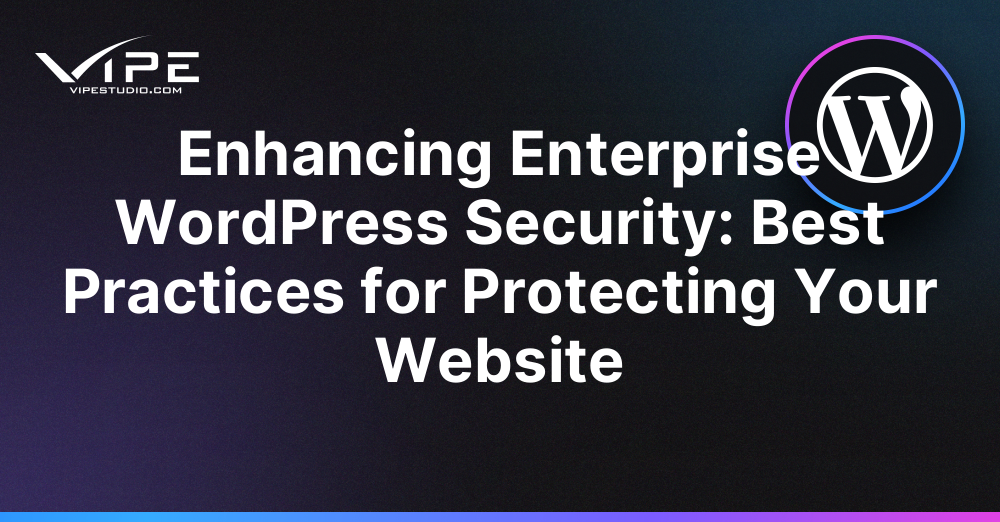02.02.2025
WordPress Development
Enhancing Enterprise WordPress Security: Best Practices for Protecting Your Website
READING TIME: MIN
Table of Content
As enterprises increasingly rely on WordPress for their digital presence, ensuring website security becomes a top priority. Cyber threats, data breaches, and unauthorized access can compromise not only business operations but also customer trust. Fortunately, WordPress offers robust security measures that, when properly implemented, can safeguard enterprise websites against vulnerabilities.
In this article, we explore the best practices for securing an enterprise WordPress website and how businesses can stay ahead of potential threats.
Understanding the Importance of Enterprise WordPress Security
Unlike personal blogs or small business websites, enterprise-level WordPress sites handle sensitive customer data, financial transactions, and proprietary business information. A security breach can lead to serious consequences, including data loss, financial damage, and reputational harm.
Key reasons why enterprises must prioritize WordPress security include:
- Protecting Customer Data: Enterprises must ensure compliance with data protection regulations like GDPR, CCPA, and HIPAA.
- Preventing Downtime: Cyberattacks can cause website outages, leading to revenue loss and disrupted operations.
- Maintaining Business Reputation: A secure website reinforces customer trust and brand credibility.
- Defending Against Evolving Threats: Hackers continuously develop new attack methods, requiring proactive security strategies.
Implementing Secure Hosting and Server Configurations
The foundation of a secure enterprise WordPress site starts with reliable hosting. Businesses should choose a hosting provider that offers:
- Managed WordPress Hosting: Providers like Kinsta, WP Engine, and Cloudways offer security-focused hosting solutions with automatic updates and threat monitoring.
- SSL Encryption: HTTPS encryption ensures secure data transmission between the website and users.
- Regular Server Security Updates: Keeping server software up to date helps mitigate vulnerabilities.
- Firewall and DDoS Protection: Web application firewalls (WAFs) and DDoS protection services enhance website security.
Strengthening User Authentication and Access Control
Unauthorized access is one of the most common causes of WordPress security breaches. Enterprises must implement strict authentication policies, including:
- Two-Factor Authentication (2FA): Requiring an additional verification step significantly reduces the risk of compromised credentials.
- Role-Based Access Control: Limiting user permissions ensures that employees only have access to necessary features.
- Strong Password Policies: Enforcing complex passwords and regular updates enhances security.
- Monitoring Login Activity: Tools like Wordfence and Sucuri help track and block suspicious login attempts.
Keeping WordPress Core, Plugins, and Themes Updated
One of the biggest vulnerabilities in WordPress websites stems from outdated software. Enterprises should establish an update routine to:
- Regularly Update WordPress Core: Each new release includes important security patches.
- Use Trusted Plugins and Themes: Only install plugins and themes from reputable sources to avoid malicious code.
- Remove Unused Plugins: Reducing the number of installed plugins minimizes potential attack points.
Implementing Security Plugins and Website Monitoring
Security plugins provide real-time monitoring, malware scanning, and proactive threat prevention. Popular security solutions for enterprise WordPress sites include:
- Wordfence: Offers firewall protection, login security, and malware scanning.
- Sucuri Security: Provides DDoS protection, security monitoring, and site hardening.
- iThemes Security: Strengthens authentication, enforces security policies, and blocks brute force attacks.
Performing Regular Backups and Disaster Recovery Planning
Even with top-tier security measures, enterprises must have a disaster recovery plan in place. Regular backups ensure quick restoration in case of cyberattacks or technical failures. Best practices include:
- Automated Daily Backups: Using backup solutions like UpdraftPlus, VaultPress, or BackupBuddy.
- Off-Site Storage: Storing backups on secure cloud platforms such as AWS S3 or Google Drive.
- Regular Restoration Testing: Periodically testing backup recovery to ensure smooth restoration when needed.
How Vipe Studio Helps Enterprises Secure Their WordPress Websites
At Vipe Studio, we provide enterprise-level WordPress security solutions, from vulnerability assessments to advanced protection strategies. Our experts implement proactive security measures, monitor threats, and ensure compliance with industry standards.
Need to strengthen your WordPress security? Contact Vipe Studio today for a custom security strategy tailored to your enterprise website.
Conclusion: Proactive Security is Essential for Enterprise WordPress Success
Enterprise WordPress websites require a multi-layered security approach to prevent cyber threats and ensure business continuity. By following best practices such as secure hosting, authentication controls, regular updates, and proactive monitoring, businesses can protect their digital assets and maintain customer trust.
With the right security measures in place, enterprises can confidently leverage WordPress as a reliable and scalable platform for their online presence.
More on The Topic
- Navigating WooCommerce Performance: Real-World Strategies
- The Role of AI in WordPress Development Workflows
- Optimizing WordPress for Enterprise: Beyond Basic Caching
- WordPress and Headless Commerce: A Provocative Dilemma
- Decoupled WordPress Architecture: The Future or a Fad?
The content of this website is copyrighted and protected by Creative Commons 4.0.



